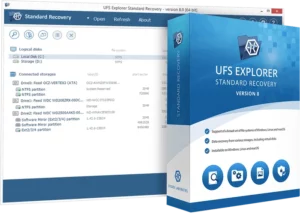UFS Explorer File Recovery Software

UFS Explorer is the golden standard in data recovery labs
UFS Explorer is a file recovery tool made by SysDev Laboratories you might not have heard of. Google Search results for phrases like “file recovery”, “data recovery” etc., unfortunately rank tools that a data recovery engineer would never use higher than high quality data recovery software.
SysDev is one of the few brands that data recovery professionals rely on for logical data recovery. Since so many labs use it, dealing with real world cases and report about problems or new developments to developer (SysDev), new features are added all the time while existing features are improved upon. As a result the tool gets better and better and more labs start using it. I call this the development – feedback loop. SysDev is always first each time when for example a NAS manufacture implements a new RAID scheme or database based file system to add this new technology. I have witnessed SysDev developers fix a critical issue the same day as it was reported.
The average PC user today uses many type of storage devices and file systems, even though he might not even be aware of this. To recover data from any of these, the tool of choice needs to be able to work with this wide array of storage technologies and file systems.
For example:
- If you’re running a Windows PC then your main drive is probably formatted with NTFS and possibly the drive is encrypted (Bitlocker).
- But if you’re a Mac user, you’re probably dealing with file systems like HFS+ or APFS and also you need the software to run on a Mac computer.
- Perhaps you’re a photographer or video record using a GoPro, and so you’re using FAT32 and exFAT formatted memory cards.
- Many people use a NAS for data storage, sharing and backup which means without them even knowing perhaps, they use Linux file systems and RAID configurations.
Maybe you have multiple systems, a mix of Mac, Linux and/or Windows. In which case there’s a good chance you use exFAT formatted external drives as a shared storage device and different file systems on all your systems.
Point is, UFS Explorer covers it all. UFS Explorer offers the most comprehensive file system support, support for various ‘software’ RAID arrays (mdadm, Apple, NT LDM, LVM, etc.), disk encryption variants, disk images etc., etc.. But for most standard scenarios such as recovering files after deletion, partition deletion, formatting, you do not need to understand any of that.

Which version is right for you?
One small gripe I have with SysDev is that I initially found it hard to figure out what version of the software is needed to address a specific scenario, so as a next step I’d like to try simplifying this for you. It boils down to two fairly simple decisions:
1. Select platform
Based on typical end user profiles I distilled two from the many versions SysDev offers for both Windows and Mac users. It is important to understand that either of the Standard versions support the same file systems and storage technologies, the only difference is the platform you use them on (Either Windows or Mac).
If you intend to use the software on a Mac system you pick the Mac version, if the platform you install and run from is Windows then you pick the Windows version.
2. Select storage type (RAID vs Single drive / Spanned volume)
The Standard edition recovers data from single drives. So this the version you pick if you intend to use the software in a standard scenario like accidental format, accidental partition deletion, a RAW file system, etc..
Any more advanced RAID virtual reconstruction/assembly requires the UFS Explorer RAID license. So for example you have a RAID controller installed in your system, are running a RAID 5 and you discover the RAID can no longer be accessed. Of course RAID version adds functionality over the Standard version. In other words, the RAID version offers all features from the Standard version + RAID support.
Important: To recover data from RAID sets the software needs access the the individual drives (or images of the drives)!
Schematically:
Operating system --> Windows (PC) --> Recover data from single drive or SPAN* --> Standard version for Windows (download)
+ Recover data from RAID array --> RAID version for Windows "
--> Macintosh --> Recover data from single drive or SPAN* --> Standard version for Mac "
+ Recover data from RAID array --> RAID version for Mac "
* – Automated assembly of spanned volumes (mdadm, Apple, NT LDM, LVM, etc.).
License
Another thing you need to understand is that the software does not stop working after a year. You can use the software as long and as often as you like, even after one year, but you’re not entitled to updates and support after one year. So this is not a software subscription in the sense that the software requires renewal for you to use it after one year.
If you want however, you can renew the license after one year to continue receiving updates. Tip: Set a reminder when you purchase the software so you can download the latest update just before your license expires.
| Buy UFS Explorer Windows |
| BUY UFS Explorer Standard Recovery for Windows – Personal License (1 year of updates) $64.95 |
| BUY UFS Explorer RAID Recovery for Windows – Personal License (1 year of updates) $139.95 |
| Buy UFS Explorer Mac |
| BUY UFS Explorer Standard Recovery for Mac – Personal License (1 year of updates) $64.95 |
| BUY UFS Explorer RAID Recovery for Mac – Personal License (1 year of updates) $139.95 |
Prices are without VAT (if applicable).
For Commercial licenses, Linux downloads and licenses, etc. check the SysDev website.